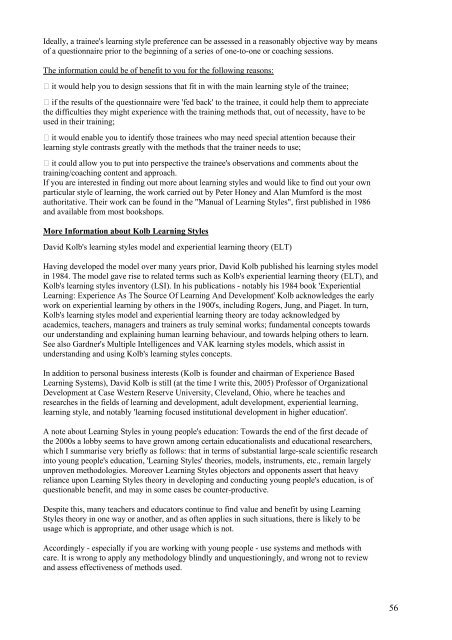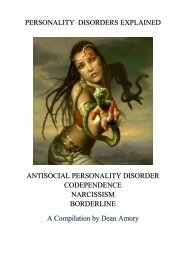How to Perform On-the-job Training - Dean Amory
According to The Encyclopedia of Business, ©2000 Gale Cengage, On-the-job training is by far the predominant form of job training. Studies also indicate that it is the most effective form of job training. Yet, it also represents a significant investment considering that roughly 30% of a new worker's time is spent in on-the-job training during the first 90 days of employment, that productivity of experienced workers assigned to train new workers may decrease during the training period, and that new workers may make expensive mistakes. Both companies and workers therefore profit largely from the presence of simple, but complete trainee and trainer guides that allow for executing OJT in a structured way. “How to perform on-the-job training”, has the information, techniques and tips that will allow you to implement a professional OJT training program. The book also includes all the tools, documents and checklists necessary for setting up a qualitative and efficient skills training program for OJT coaches
According to The Encyclopedia of Business, ©2000 Gale Cengage, On-the-job training is by far the predominant form of job training. Studies also indicate that it is the most effective form of job training. Yet, it also represents a significant investment considering that roughly 30% of a new worker's time is spent in on-the-job training during the first 90 days of employment, that productivity of experienced workers assigned to train new workers may decrease during the training period, and that new workers may make expensive mistakes.
Both companies and workers therefore profit largely from the presence of simple, but complete trainee and trainer guides that allow for executing OJT in a structured way.
“How to perform on-the-job training”, has the information, techniques and tips that will allow you to implement a professional OJT training program. The book also includes all the tools, documents and checklists necessary for setting up a qualitative and efficient skills training program for OJT coaches
Create successful ePaper yourself
Turn your PDF publications into a flip-book with our unique Google optimized e-Paper software.
Ideally, a trainee's learning style preference can be assessed in a reasonably objective way by means<br />
of a questionnaire prior <strong>to</strong> <strong>the</strong> beginning of a series of one-<strong>to</strong>-one or coaching sessions.<br />
The information could be of benefit <strong>to</strong> you for <strong>the</strong> following reasons:<br />
it would help you <strong>to</strong> design sessions that fit in with <strong>the</strong> main learning style of <strong>the</strong> trainee;<br />
if <strong>the</strong> results of <strong>the</strong> questionnaire were 'fed back' <strong>to</strong> <strong>the</strong> trainee, it could help <strong>the</strong>m <strong>to</strong> appreciate<br />
<strong>the</strong> difficulties <strong>the</strong>y might experience with <strong>the</strong> training methods that, out of necessity, have <strong>to</strong> be<br />
used in <strong>the</strong>ir training;<br />
it would enable you <strong>to</strong> identify those trainees who may need special attention because <strong>the</strong>ir<br />
learning style contrasts greatly with <strong>the</strong> methods that <strong>the</strong> trainer needs <strong>to</strong> use;<br />
it could allow you <strong>to</strong> put in<strong>to</strong> perspective <strong>the</strong> trainee's observations and comments about <strong>the</strong><br />
training/coaching content and approach.<br />
If you are interested in finding out more about learning styles and would like <strong>to</strong> find out your own<br />
particular style of learning, <strong>the</strong> work carried out by Peter Honey and Alan Mumford is <strong>the</strong> most<br />
authoritative. Their work can be found in <strong>the</strong> "Manual of Learning Styles", first published in 1986<br />
and available from most bookshops.<br />
More Information about Kolb Learning Styles<br />
David Kolb's learning styles model and experiential learning <strong>the</strong>ory (ELT)<br />
Having developed <strong>the</strong> model over many years prior, David Kolb published his learning styles model<br />
in 1984. The model gave rise <strong>to</strong> related terms such as Kolb's experiential learning <strong>the</strong>ory (ELT), and<br />
Kolb's learning styles inven<strong>to</strong>ry (LSI). In his publications - notably his 1984 book 'Experiential<br />
Learning: Experience As The Source Of Learning And Development' Kolb acknowledges <strong>the</strong> early<br />
work on experiential learning by o<strong>the</strong>rs in <strong>the</strong> 1900's, including Rogers, Jung, and Piaget. In turn,<br />
Kolb's learning styles model and experiential learning <strong>the</strong>ory are <strong>to</strong>day acknowledged by<br />
academics, teachers, managers and trainers as truly seminal works; fundamental concepts <strong>to</strong>wards<br />
our understanding and explaining human learning behaviour, and <strong>to</strong>wards helping o<strong>the</strong>rs <strong>to</strong> learn.<br />
See also Gardner's Multiple Intelligences and VAK learning styles models, which assist in<br />
understanding and using Kolb's learning styles concepts.<br />
In addition <strong>to</strong> personal business interests (Kolb is founder and chairman of Experience Based<br />
Learning Systems), David Kolb is still (at <strong>the</strong> time I write this, 2005) Professor of Organizational<br />
Development at Case Western Reserve University, Cleveland, Ohio, where he teaches and<br />
researches in <strong>the</strong> fields of learning and development, adult development, experiential learning,<br />
learning style, and notably 'learning focused institutional development in higher education'.<br />
A note about Learning Styles in young people's education: Towards <strong>the</strong> end of <strong>the</strong> first decade of<br />
<strong>the</strong> 2000s a lobby seems <strong>to</strong> have grown among certain educationalists and educational researchers,<br />
which I summarise very briefly as follows: that in terms of substantial large-scale scientific research<br />
in<strong>to</strong> young people's education, 'Learning Styles' <strong>the</strong>ories, models, instruments, etc., remain largely<br />
unproven methodologies. Moreover Learning Styles objec<strong>to</strong>rs and opponents assert that heavy<br />
reliance upon Learning Styles <strong>the</strong>ory in developing and conducting young people's education, is of<br />
questionable benefit, and may in some cases be counter-productive.<br />
Despite this, many teachers and educa<strong>to</strong>rs continue <strong>to</strong> find value and benefit by using Learning<br />
Styles <strong>the</strong>ory in one way or ano<strong>the</strong>r, and as often applies in such situations, <strong>the</strong>re is likely <strong>to</strong> be<br />
usage which is appropriate, and o<strong>the</strong>r usage which is not.<br />
Accordingly - especially if you are working with young people - use systems and methods with<br />
care. It is wrong <strong>to</strong> apply any methodology blindly and unquestioningly, and wrong not <strong>to</strong> review<br />
and assess effectiveness of methods used.<br />
56


















